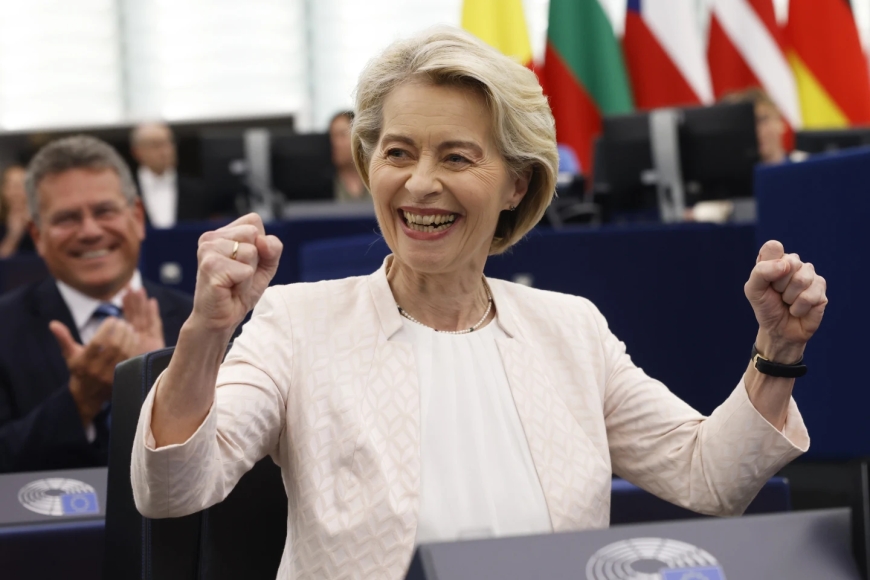Ursula von der Leyen Reelected for Second Term as European Commission President

Ursula von der Leyen has been reelected to a second five-year term as president of the European Union's executive commission, securing a comfortable majority in the European Parliament and averting a potential leadership vacuum.
Von der Leyen raised both fists in victory as Parliament President Roberta Metsola announced the results. She hailed her reelection as a triumph for "pro-European, pro-Ukraine, and pro-rule of law" lawmakers, emphasizing her commitment to a strong Europe amidst various crises, including the war in Ukraine, climate change, migration, and housing shortages.
In her victory speech, von der Leyen stressed the importance of strengthening democracy within the 27-nation bloc. "Our democracy is under attack from inside and outside," she said. "It is crucial that democratic forces stand together to defend our democracy."
German Chancellor Olaf Scholz congratulated von der Leyen on social media, calling her reelection "a clear sign of our ability to act in the European Union, especially in difficult times."
A decisive 401 lawmakers in the 720-seat legislature voted in favor of von der Leyen following her pledges to lead Europe through its current crises. This vote followed a strong showing by the far-right in the recent European Parliament elections, highlighting the political challenges ahead.
Italy’s far-right League party criticized von der Leyen’s victory, claiming it betrayed millions of voters seeking change and would result in harmful policies influenced by "green extremists." In response, von der Leyen reaffirmed her commitment to countering demagoguery and extremism, vowing to defend the European way of life.
In her address, von der Leyen outlined plans to bolster the EU's economy, enhance police and border agencies, address migration, and pursue climate policies. She also promised to tackle housing shortages and appoint a commissioner for the Mediterranean region, addressing its unique challenges.
Von der Leyen did not shy away from criticizing Hungarian Prime Minister Viktor Orbán for his recent visit to Russia. She dismissed Orbán's trip as "appeasement" and reiterated the EU's steadfast support for Ukraine.
Over the past five years, von der Leyen has guided the EU through Brexit, the COVID-19 pandemic, and Russia's invasion of Ukraine. She has also championed the EU Green Deal, aiming for climate neutrality by 2050. However, she faced criticism for the opacity of vaccine negotiations during the pandemic, with the EU general court recently ruling that the commission failed to provide sufficient public access to information about vaccine purchase agreements.
Following the European Parliament elections, EU leaders finalized appointments for key positions within the bloc. Antonio Costa of Portugal will serve as European Council president, and Estonia’s Kaja Kallas, a staunch Ukraine supporter and Russia critic, has been nominated as the EU's top diplomat, pending parliamentary approval later this year.
Von der Leyen's reelection coincided with newly elected U.K. Prime Minister Keir Starmer hosting European heads of government to discuss migration, energy security, and the threat from Russia. Starmer expressed his eagerness to reset U.K.-EU relations, congratulating von der Leyen and looking forward to close collaboration.
With her reelection, von der Leyen continues to play a pivotal role in shaping the future of the EU, navigating complex political landscapes and ensuring the bloc's stability and progress.













































